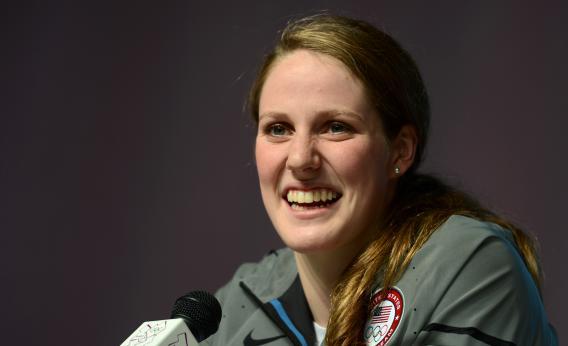It’s been the year of the woman at the London Olympics. Qatar and Saudi Arabia sent female athletes for the first time, women’s boxing made its debut, and China and the United States are the runaway leaders in the medal count thanks in large part to huge hauls by their female contingents. On Wednesday night, Bob Costas told the primetime audience that women had won 23 of the United States’ 34 gold medals. By the end of Thursday’s action, the totals had moved to 26 of 39 golds for the U.S. women and 51 of 90 medals overall.
What’s the explanation for the dominance of Team XX on Team USA? On Wednesday, Linda Greenhouse argued in the New York Times that credit should go to Title IX, the 1972 legislation that, among other things, granted women equal access to collegiate athletic scholarships. Greenhouse also credited the Supreme Court for giving it teeth, ensuring that the law would be “the powerful force for women’s advancement … that it is today.”
Greenhouse is right that Title IX has been a boon for women. It was also a necessary step for government to take, as colleges weren’t giving female athletes anywhere near an equal opportunity to earn scholarships or compete. Hundreds of thousands of women, no doubt, have earned college degrees thanks to the scholarships they got to play basketball, soccer, field hockey, and to run track.
But even a cursory look at the results of the U.S. women in these Olympics shows that Title IX is not a one-size-fits-all explanation for what’s happening at these games. Even if you consider that the legislation has led to a dramatic increase in participation in high school sports, many of the athletes who compete in Olympic sports opt out of the scholastic system altogether, instead training with private clubs or national teams. This splintering from school teams happens years before top women athletes get to high school.
Take the swimmers, for example. Katie Ledecky, who won gold in the 800-meter freestyle, is 15 years old. Four-time Olympic gold medalist Missy Franklin is all of 17. She began her career, as swimmers of all abilities do, swimming for a summer club. Even today, the bulk of her training is with her private club and the coach she’s been with since she was 7. It’s also worth noting that in the 1972 Olympics that were held just two months after Title IX was signed into law, American women won eight of 14 gold medals in the pool. In 2012, members of the U.S. team won eight of 16 golds. Title IX or no Title IX, American swimmers have always dominated.
Also consider gymnastics: Aly Raisman and Jordyn Wieber were the grand dames of the U.S. women’s team at the ripe old age of 18. Training to be an Olympic gymnast requires a ridiculous amount of practice, and many thousands of dollars, even from a young age. Girls start tumbling as toddlers.
Further, a significant number of the medals won by U.S. women came in sports that the NCAA doesn’t sanction and few if any high schools offer, including judo, cycling, and shooting.
There are certainly women on the U.S. Olympic team who can credit their athletic careers more directly to Title IX. Our soccer, basketball, and volleyball programs would not be nearly as dominant if the legislation were not in place. It’s also true that Title IX helped create an atmosphere that nurtured girls’ ability to play sports, no matter what that sport happened to be. But it takes a tremendous amount of effort and courage and hard work for anyone, man or woman, to make it to the games, much less win Olympic gold. Let them have their moment, and let them take credit for it.
